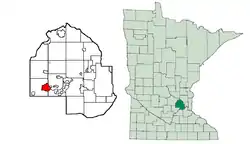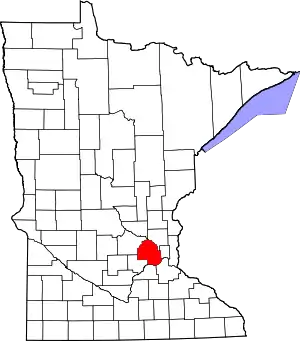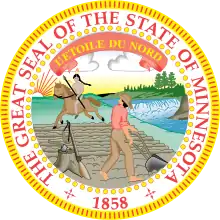Mound, Minnesota
Mound is a city in Hennepin County, Minnesota, United States. The population was 9,052 at the 2010 census.[4] Mound is the birthplace of the Tonka truck, named after Lake Minnetonka. The Tonka Toys headquarters was originally in Mound, but moved to facilitate material deliveries. Mound is approximately 22 miles (35 km) west of downtown Minneapolis, the county seat.
Mound | |
|---|---|
 Location of Mound within Hennepin County, Minnesota | |
| Country | United States |
| State | Minnesota |
| County | Hennepin |
| Government | |
| • Mayor | Raymond J Salazar |
| Area | |
| • Total | 5.08 sq mi (13.15 km2) |
| • Land | 2.86 sq mi (7.41 km2) |
| • Water | 2.22 sq mi (5.74 km2) |
| Population | |
| • Total | 1,357 |
| • Estimate (2019)[3] | 9,509 |
| • Density | 3,323.66/sq mi (1,283.29/km2) |
| Time zone | UTC-6 (Central (CST)) |
| • Summer (DST) | UTC-5 (CDT) |
| Area code(s) | 952 Exchanges: 472,491,495 |
| FIPS code | 27-44476 |
| Website | www |
Geography


According to the United States Census Bureau, the city has a total area of 4.96 square miles (12.85 km2), of which 2.86 square miles (7.41 km2) is land and 2.10 square miles (5.44 km2) is water.[5] County Roads 15 and 110 are two of the main routes.
Lakes in Mound include Black Lake, Dutch Lake, Lake Langdon, Saunders Lake, and Seton Lake. Lake Minnetonka encompasses these and many others in the area. Mound has more than 1,000 docks on its various lakes. The lakes geographically define the town's areas, such as Three Points, The Island, The Highlands, Grandview Boulevard and Shirley Hills.
Lake Langdon is located immediately west of Mound, between an old Great Northern railroad line and Lake Minnetonka. One of its most notable places is an old ice house and grocery store at the east side of the lake. The store for many years in the 1940s and 1950s was owned and operated by Ed and Pete Sollie, uncles of the Andrews Sisters singing group. Other historic places on the east shore of Lake Langdon are Our Lady of the Lake parochial school, and the Mound Baptist Church, long cared for by Ulrich Eugster, an immigrant to the U.S. from Reute, Switzerland.
History
| Historical population | |||
|---|---|---|---|
| Census | Pop. | %± | |
| 1930 | 206 | — | |
| 1940 | 526 | 155.3% | |
| 1950 | 1,357 | 158.0% | |
| 2019 (est.) | 9,509 | [3] | |
| U.S. Decennial Census for Island Park[6] | |||
According to Melvin Gimmestad's Historical Backgrounds of Mound, Minnesota, "Mound derived its name from the Indian mounds once found within the present day city limits. They were not built by the Dakota Indians, but were made by prehistoric Indians".[7]
The former municipality of Island Park, which contained of Phelps Island, merged with Mound in 1960.[8]
Mound celebrated its centennial in 2012.
Education
Because the Westonka School District encompasses Mound, the city is also connected to Spring Park, Orono, St. Bonifacius, and Minnetrista. Mound schools include Grandview Middle School, Hilltop Primary School, Mound–Westonka High School, and Shirley Hills Elementary. The school mascot is the Whitehawk, which was changed from the Mohawk in 1997. Some students attend public schools in other school districts chosen by their families under Minnesota's open enrollment statute.
Local sites
The Mound City Council has been working for several years on a project named "Mound Visions". One of the project's goals is to improve business traffic in the city. Some of its recent accomplishments are the Mound Marketplace, the realignment of County Road 15, the Lost Lake Greenway, and the Villas on Lost Lake townhouses.
Demographics
| Historical population | |||
|---|---|---|---|
| Census | Pop. | %± | |
| 1920 | 393 | — | |
| 1930 | 668 | 70.0% | |
| 1940 | 1,189 | 78.0% | |
| 1950 | 2,061 | 73.3% | |
| 1960 | 5,440 | 163.9% | |
| 1970 | 7,572 | 39.2% | |
| 1980 | 9,280 | 22.6% | |
| 1990 | 9,634 | 3.8% | |
| 2000 | 9,435 | −2.1% | |
| 2010 | 9,052 | −4.1% | |
| 2018 (est.) | 9,530 | [9] | 5.3% |
| U.S. Decennial Census[10] 2013 Estimate[11] | |||
2010 census
As of the census[2] of 2010, there were 9,052 people, 3,974 households, and 2,444 families living in the city. The population density was 3,165.0 inhabitants per square mile (1,222.0/km2). There were 4,379 housing units at an average density of 1,531.1 per square mile (591.2/km2). The racial makeup of the city was 95.8% White, 0.9% African American, 0.3% Native American, 1.3% Asian, 0.4% from other races, and 1.4% from two or more races. Hispanic or Latino of any race were 1.8% of the population.
There were 3,974 households, of which 27.8% had children under the age of 18 living with them, 48.1% were married couples living together, 8.6% had a female householder with no husband present, 4.9% had a male householder with no wife present, and 38.5% were non-families. 30.7% of all households were made up of individuals, and 7.9% had someone living alone who was 65 years of age or older. The average household size was 2.28 and the average family size was 2.85.
The median age in the city was 42.6 years. 21.3% of residents were under the age of 18; 6.4% were between the ages of 18 and 24; 25.9% were from 25 to 44; 35% were from 45 to 64; and 11.5% were 65 years of age or older. The gender makeup of the city was 51.5% male and 48.5% female.
2000 census
As of the 2000 census, there were 9,435 people, 3,982 households, and 2,560 families living in the city. The population density was 3,203.8 people per square mile (1,239.1/km2). There were 4,118 housing units at an average density of 1,398.3 per square mile (540.8/km2). The diverse racial makeup of the city was 96.24% White, 0.64% African American, 0.19% Native American, 1.30% Asian, 0.04% Pacific Islander, 0.45% from other races, and 1.14% from two or more races. Hispanic or Latino of any race were 0.96% of the population. 32.4% were of German, 14.1% Norwegian, 11.8% Irish, 7.7% Swedish and 6.1% English ancestry.
There were 3,982 households, out of which 30.2% had children under the age of 18 living with them, 53.5% were married couples living together, 7.4% had a female householder with no husband present, and 35.7% were non-families. 28.3% of all households were made up of individuals, and 7.0% had someone living alone who was 65 years of age or older. The average household size was 2.37 and the average family size was 2.93.
In the city, the population was spread out, with 23.9% under the age of 18, 6.2% from 18 to 24, 35.6% from 25 to 44, 25.4% from 45 to 64, and 9.0% who were 65 years of age or older. The median age was 38 years. For every 100 females, there were 108.3 males. For every 100 females age 18 and over, there were 106.9 males.
The median income for a household in the city was $60,671, and the median income for a family was $68,396. Males had a median income of $44,437 versus $34,125 for females. The per capita income for the city was $30,309. About 0.9% of families and 2.7% of the population were below the poverty line, including 1.7% of those under age 18 and 5.1% of those age 65 or over.
Notable people
- Sheldon Beise – All-American fullback on Bernie Bierman's undefeated national championship football teams at the University of Minnesota, 1934–1935
- The Andrews Sisters singing group – Patty, Maxene and LaVerne spent summers in Mound as children from 1918 through 1931, and returned to visit at least one week each July. They visited their uncles Pete and Ed Sollie at their small grocery store, often visited the Mound Casino, and relaxed at the Mound swimming beach, reminiscing about their childhood.
- Kevin Sorbo – Actor, born and raised in Mound.
- Kris Humphries – Professional basketball player and ex-husband of Kim Kardashian, has a home in Mound on the shores of Lake Minnetonka, which was featured on the wedding special of Keeping up with the Kardashians.
- Henning Linden – U.S. Army Brigadier General during World War II, born in Mound.
- Dennis Frederiksen - former member of the band Toto.
- Christopher O'Malley – President and CEO of Compuware, born and raised in Mound.
- Taylor Matson – Professional ice hockey player
References
- "2019 U.S. Gazetteer Files". United States Census Bureau. Retrieved July 26, 2020.
- "U.S. Census website". United States Census Bureau. Retrieved 2012-11-13.
- "Population and Housing Unit Estimates". United States Census Bureau. May 24, 2020. Retrieved May 27, 2020.
- "2010 Census Redistricting Data (Public Law 94-171) Summary File". American FactFinder. U.S. Census Bureau, 2010 Census. Retrieved 23 April 2011.
- "US Gazetteer files 2010". United States Census Bureau. Archived from the original on 2012-07-02. Retrieved 2012-11-13.
- United States Census Bureau. "Census of Population and Housing". Retrieved May 3, 2019.
- Upham, Warren (2001). Minnesota Place Names. Minnesota Historical Society Press. p. 231. ISBN 0-87351-396-7.
- https://www.cityofmound.com/vertical/Sites/%7B2E4C20C8-5A79-4517-A724-CB4891DAF341%7D/uploads/History_of_Mound.pdf
- "Population and Housing Unit Estimates". Retrieved August 18, 2019.
- United States Census Bureau. "Census of Population and Housing". Retrieved July 14, 2014.
- "Population Estimates". United States Census Bureau. Retrieved 2014-07-14.

